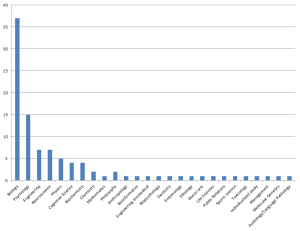I have often been curious about where neuroscientists come from in an academic career / interests sense. Meaning: what kind of interests did they first start with, when they were young and innocent ;). So, after someone on Twitter brought this topic up again, I made a quick survey using SurveyMonkey and posted it on Twitter and Facebook. Here I want to share the results.
It took less than 12 hours to get 100 responses which is the cut off for free SurveyMonkey usage. Thus, sadly, although I had over 100 responses and people were still sharing the Survey after I closed it, we can only look at the first 100 entries. Otherwise I would have had to buy a premium account for an unreasonable amount of money for what I wanted to do with it.
The Results
The ‘raw’ data are summarized in a table that you can download. It tells you how many people chose which answer and it includes information about people with double majors / two separate degrees, also.
Overall the distribution looks like this:
 The by far most common route to neuroscience appears to be through the study of biology (37). In three of these cases this was paired with additional majors or degrees in mathematics (1) or neuroscience (2). In addition you see many programs using the prefix Bio-, like in biochemistry (3), bioinformatics (1), biomedical engineering (1), Biopsychology (1). Such fields can be viewed (and taught) with different priorities and it’s hard to say whether biochemistry, for example, is biology focussed on chemical processes, or chemistry focussed on biological systems. However, taking all of these together, the main driver for this sample of neuroscientists is the study of life.
The by far most common route to neuroscience appears to be through the study of biology (37). In three of these cases this was paired with additional majors or degrees in mathematics (1) or neuroscience (2). In addition you see many programs using the prefix Bio-, like in biochemistry (3), bioinformatics (1), biomedical engineering (1), Biopsychology (1). Such fields can be viewed (and taught) with different priorities and it’s hard to say whether biochemistry, for example, is biology focussed on chemical processes, or chemistry focussed on biological systems. However, taking all of these together, the main driver for this sample of neuroscientists is the study of life.
Then, on 2nd place, there is psychology which was studied by 15 neuroscientists. Surely closely related I would think, is the study of cognitive science (4).
Neuroscience itself is on place 3 with 7 respondents having exclusively that and two more studied it in addition to biology. As someone pointed out, neuroscience as a major is a relatively recent development.
Finally, these are followed by engineering (7) and physics (5), and only an honorary mention can go out to mathematics, which was mentioned 3 times but mostly in combination with other fields.
Only few people who are now in neuroscience started out from the arts.
Overall this reflects what I expected: most people seem to come from an interest in life, then ‘the mind’, and then natural things. However, there are still those who came from a maybe somewhat unlikely angle.
I wonder what the stories are behind the many ‘special cases’ that came up already in this small survey!
Some voices on Twitter:
A lot of neuro people I know did their UG in physics or something so I guess by analogy I’m going to end up in, like, magnetohydrodynamics?
— Tzetze (@mnxmnkmnd) 31. März 2015
@DennisEckmeier do let us know about the results – my feeling is neuro is drawing ppl from quite diverse backgrounds
— Maciej_Kosilo (@M_Kosilo) 31. März 2015
And I got educated about “Cognitive Science“
@DennisEckmeier @fMRI_guy It's interdisciplinary: Psychology + Neuroscience + Computer Science + Linguistics + Philosophy
— Emilie Reas (@etreas) 31. März 2015
.@GainesOnBrains @DennisEckmeier math/econ/philosophy. I never took a science class.
— Adam J Calhoun (@neuroecology) 31. März 2015
@DennisEckmeier In my subfield of computational neurosci, most are math, physics, electrical engineering majors. Some biophysics&philosophy
— Il Memming Park (@memming) 31. März 2015